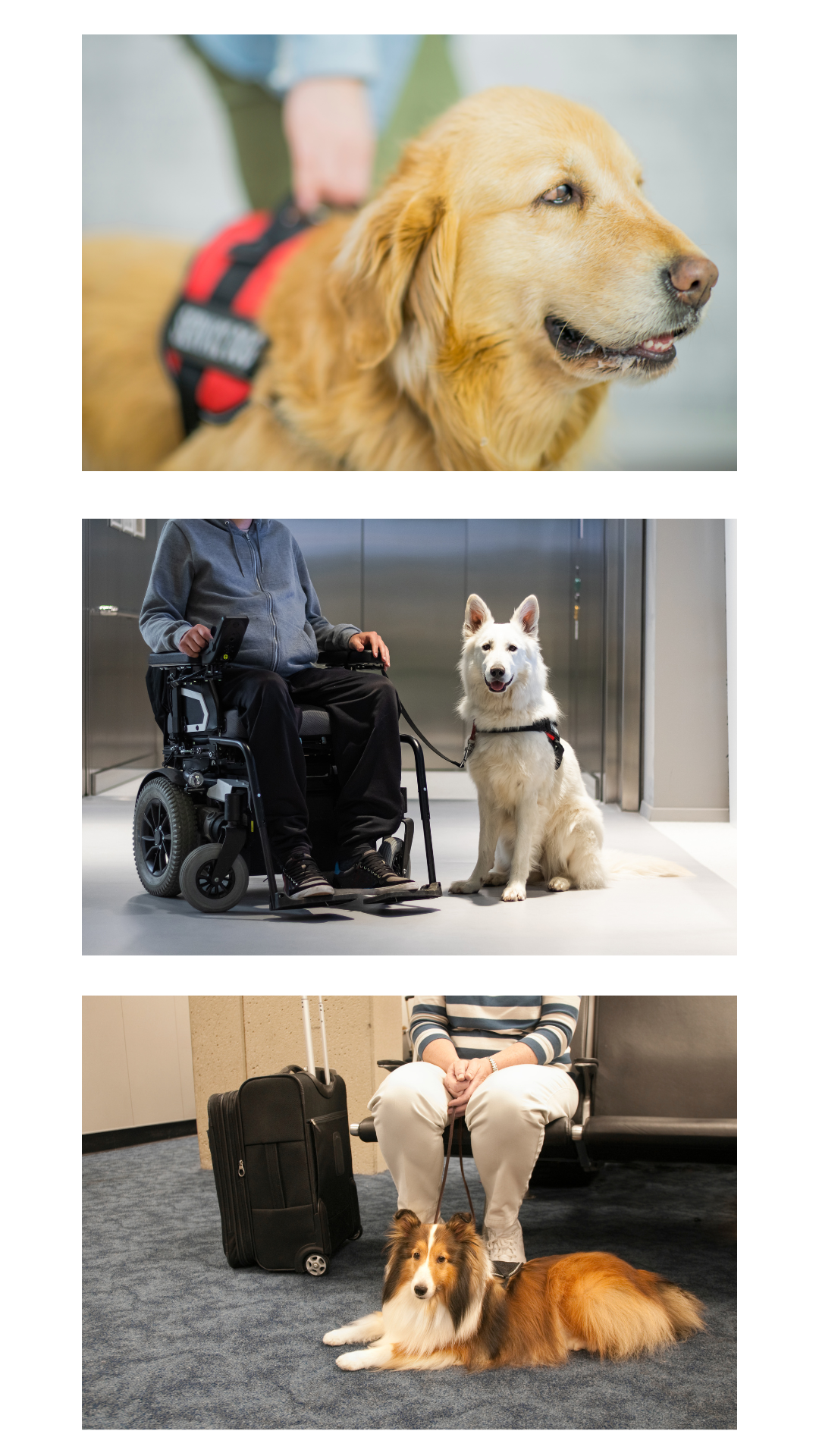Owning a service dog
Owning a service dog is a significant commitment that comes with various responsibilities. Here are the steps and key responsibilities involved in owning a service dog:
- Determine Eligibility: The first step is to determine if you are eligible for a service dog. Service dogs are typically trained to assist individuals with disabilities, including physical, sensory, psychiatric, intellectual, or other impairments that substantially limit one or more major life activities.
- Choose the Right Dog: Once you establish eligibility, the next step is to choose the right dog. Some people work with service dog organizations that have already trained dogs available for placement, while others may opt to train their own dog or work with a professional dog trainer.
- Training: If you decide to train your own service dog or work with a trainer, the dog will need to undergo specialized training to perform tasks that mitigate your specific disability-related needs. This training can take several months to years, depending on the complexity of the tasks and the dog's aptitude.
- Legal Considerations: Familiarize yourself with the laws and regulations governing service dogs in your region or country. Understand your rights and responsibilities as a service dog handler, as well as the rights of businesses and public establishments when it comes to accommodating service dogs.
- Public Access Training: Service dogs must be well-behaved and well-trained to accompany you in public places. They should be obedient, non-aggressive, and under your control at all times. Public access training is crucial to ensure that the service dog behaves appropriately in various environments.
- Health and Veterinary Care: Regular veterinary check-ups and health maintenance are essential to keep the service dog in good physical condition. Ensure they are up-to-date on vaccinations and receive proper nutrition and exercise.
- Socialization: Proper socialization is crucial to ensure that the service dog is comfortable and confident in various social situations. Expose the dog to different environments, people, animals, and noises to help them acclimate to diverse settings.
- Financial Responsibilities: Owning a service dog can be costly, including expenses for training, veterinary care, food, equipment (such as vests and harnesses), and ongoing maintenance. Be prepared for these financial responsibilities.
- Advocacy and Education: As a service dog handler, you may encounter situations where you need to educate others about the role and rights of service dogs. Be an advocate for the service dog community, helping to raise awareness and promote positive interactions.
- Commitment and Bonding: Finally, owning a service dog is a long-term commitment. Building a strong bond and maintaining a positive working relationship with your service dog is essential for a successful partnership.

Remember that owning a service dog can be life-changing and incredibly rewarding. It's a journey that requires dedication, patience, and a deep understanding of the unique responsibilities that come with having a service dog by your side.
Types of Service Dogs
-
Guide Dogs:
Guide dogs assist individuals who are blind or visually impaired by navigating obstacles and helping them safely travel from one location to another.
-
Hearing Dogs:
These dogs are trained to assist individuals who are deaf or hard of hearing by alerting them to important sounds such as doorbells, alarms, or someone calling their name.
-
Mobility Assistance Dogs:
These dogs aid individuals with mobility impairments by helping them with tasks such as opening doors, retrieving items, or providing stability and balance support.
-
Medical Alert Dogs:
These dogs are trained to detect changes in a person's body odor or behavior associated with certain medical conditions, such as seizures, diabetes, or allergies. They can then alert their handlers or others to take appropriate action.
-
Psychiatric Service Dogs:
Trained to assist individuals with mental health conditions, psychiatric service dogs can provide support by interrupting destructive behaviors, providing comfort during anxiety or panic attacks, and creating personal space in crowded environments.
-
Autism Assistance Dogs:
Specifically trained to assist individuals with autism spectrum disorders, these dogs can provide calming effects, reduce stress, and offer companionship to help with social interactions.
-
Seizure Response Dogs:
These dogs are trained to respond during or after a seizure. They may provide physical support, retrieve medications, or seek help from others.
-
Allergy Detection Dogs:
Trained to detect specific allergens, these dogs can help individuals with severe allergies by alerting them to potential dangers or even retrieving medication.
-
Diabetic Alert Dogs:
These dogs are trained to detect changes in blood sugar levels and alert individuals with diabetes, allowing them to take necessary actions to manage their condition.
-
PTSD (Post-Traumatic Stress Disorder) Dogs:
Trained to assist individuals with PTSD, these dogs can provide emotional support, interrupt anxiety-inducing behaviors, and create a sense of security.

These are only some of the disabilities which service dogs serve to, but there are more disabilities which might be more specific for each user.
It's important to note that service dogs are protected by laws in many countries, allowing them to accompany their handlers in public places and ensuring equal access. Each service dog is trained based on the specific needs of its handler, and the tasks they perform contribute to enhancing the individual's independence and quality of life.
How does Lean on me Canine Assistance work?
Each user has a different condition and has different needs, remember that finding the right service dog trainer may take time and research, but investing in proper training will lay the foundation for a successful and fulfilling partnership with your service dog.
At Lean on me Canine Assistance we provide you with the information to start the necessary process and complete the necessary training for your requirements.
Contact us:
asistenciacaninalmca@gmail.com
